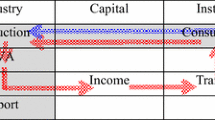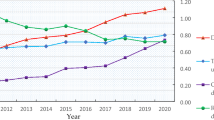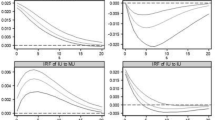Abstract
Social upgrading does not inherently follow economic upgrading; rather, they present a complex interplay. This paper, focusing on China, utilizes the coupling coordination degree and a panel regression model to shed light on the intricate interaction between social upgrading and economic upgrading. It is found that the coupling coordination degree of social and economic upgrading in China has improved from 0.33 to 0.49 since the mid-1990s, undergoing a shift from a stage of slight imbalance to low-level coordination. However, significant regional disparities are present in terms of economic upgrading, social upgrading, and their coupling coordination degree. Developed areas exhibit a higher degree of coupling coordination compared to less developed regions, indicating a connection between the coupling coordination degree and the level of economic growth. Economic globalization, public governance, and the legal environment positively impact the coupling coordination between social and economic upgrading, while economic privatization and corporate violations of law exert negative effects. The paper concludes with policy discussions for enhancing the coupling coordination between social and economic upgrading.
Similar content being viewed by others
References
Ahmed N, Nathan D, 2014. Capturing the gains: Improving wages and working conditions in the Bangladeshi garment sector: The role of horizontal and vertical relations. https://citeseerx.ist.psu.edu/viewdoc/download?.
Anner M, 2022. The governance challenges of social upgrading in apparel global value chains in the context of a sourcing squeeze and the Covid-19 pandemic. In: Teipen C eds. Economic and Social Upgrading in Global Value Chains: Comparative Analyses, Macroeconomic Effects, the Role of Institutions and Strategies for the Global South. Berlin: Springer International Publishing: 361–384.
Barrientos S, Gereffi G, Rossi A, 2011. Economic and social upgrading in global production networks: A new paradigm for a changing world. International Labour Review, 150(3/4): 319–340.
Barrientos S, Knorringa P, Evers B et al., 2016. Shifting regional dynamics of global value chains: Implications for economic and social upgrading in African horticulture. Environment and Planning A: Economy and Space, 48(7): 1266–1283.
Bernhardt T, Milberg W, 2011. Does economic upgrading generate social upgrading? Insights from the horticulture, apparel, mobile phones and tourism sectors. https://doi.org/10.2139/ssrn.1987694.
Bernhardt T, Pollak R, 2016. Economic and social upgrading dynamics in global manufacturing value chains: A comparative analysis. Environment and Planning A: Economy and Space, 48(7): 1220–1243.
Biglaiser G, Lee H, 2019. The effects of different entry modes of foreign direct investment on labor rights in the developing world. Journal of Human Rights, 18(2): 165–183.
Butollo F, 2013. Moving beyond cheap labour? Industrial and social upgrading in the garment and LED industries of the Pearl River Delta. Journal of Current Chinese Affairs, 42(4): 139–170.
Chen Y L, Shen S L, Zhou A, 2022. Assessment of red tide risk by integrating CRITIC weight method, TOPSIS-ASSETS method, and Monte Carlo simulation. Environmental Pollution, 314: 120254.
Cheong T S, Wu Y, 2014. The impacts of structural transformation and industrial upgrading on regional inequality in China. China Economic Review, 31(3): 339–350.
Coe N M. 2013. Geographies of production III: Making space for labour. Progress in Human Geography, 37(2): 271–284.
Danish M, Khattak A, 2020. Economic and social upgrading of firms in football global value chains. Journal of Distribution Science, 18(4): 97–106.
Davies J, 2020. Criminological reflections on the regulation and governance of labour exploitation. Trends in Organized Crime, 23(1): 57–76.
Demirguc-Kunt A, Love I, Maksimovic V, 2006. Business environment and the incorporation decision. Journal of Banking & Finance, 30(11): 2967–2993.
Fan Z, Ning X, Chao W et al., 2023. Multi-scale coupling analysis of urbanization and ecosystem services supply-demand budget in the Beijing-Tianjin-Hebei region, China. Journal of Geographical Sciences, 33(2): 340–358.
Gambardella A, Panico C, Valentini G, 2015. Strategic incentives to human capital. Strategic Management Journal, 36(1): 37–52.
Gereffi G, 1999. International trade and industrial upgrading in the apparel commodity chain. Journal of International Economics, 48(1): 37–70.
Gereffi G, 2005. The global economy: Organization, governance and development. In: Neil J S, Richard S eds. Handbook of Economic Sociology. 2nd ed. Princeton, NJ, Princeton University Press/Russell Sage Foundation, 160–182.
Gereffi G, Lee J, 2016. Economic and social upgrading in global value chains and industrial clusters: Why governance matters. Journal of Business Ethics, 133(1): 25–38.
Hartvigsen M, 2014. Land reform and land fragmentation in Central and Eastern Europe. Land Use Policy, 36: 330–341.
Huang G Z, Xing Z G, Wei C Z et al., 2022. The driving effect of informal economies on urbanization in China. Journal of Geographical Sciences, 32(5): 785–805.
Huang G Z, Zhou J, 2021a. A review of international research on social upgrading and its implications for China. Human Geography, 36(3): 15–23, 107. (in Chinese)
Huang G Z, Zhou J, 2021b. Measurement, spatiotemporal pattern and driving mechanism of social upgrading in China. Acta Geographica Sinica, 76(12): 3043–3060. (in Chinese)
Huang J C, Ying N, Yu G, 2020. Spatiotemporal characteristics and driving mechanism of the coupling coordination degree of urbanization and ecological environment in Kazakhstan. Journal of Geographical Sciences, 30(11): 1802–1824.
Jindra B, Hatani F, Steger T et al., 2019. Social upgrading and cooperative corporate social responsibility in global value chains: The case of Fairphone in China. Global Networks, 19(3): 371–393.
Kuruvilla S, Lee C, Gallagher M, 2011. From Iron Rice Bowl to Informalization: Markets, Workers and the State in a Changing China. Ithaca, NY: Cornell University Press.
Lee C, 2007. Against the Law: Labor Protests in China’s Rustbelt and Sunbelt. Berkeley, CA: University of California Press.
Lee J, Gereffi G, 2015. Global value chains, rising power firms and economic and social upgrading. Critical Perspectives on International Business, 11(3/4): 319–339.
Li M, Guan S, 2022. Does China’s state-owned sector lead industrial transformation and upgrading? Journal of Cleaner Production, 338: 130–412.
Lin J Y, 2021. State-owned enterprise reform in China: The new structural economics perspective. Structural Change and Economic Dynamics, 58(3): 106–111.
Liu Y J, Yi Q P, He L, 2017. The industry-university collaborative innovation effect on regional innovation performance in Yangtze River Economic Belt. Economic Geography, 37(9): 1–10. (in Chinese)
Lohmeyer N, Schüßler E, Kabeer N, 2022. Social upgrading in the Bangladeshi garment sector since Rana Plaza: Why some governance matters more than others. In: Teipen C ed. Economic and Social Upgrading in Global Value Chains: Comparative Analyses, Macroeconomic Effects, the Role of Institutions and Strategies for the Global South. Berlin: Springer International Publishing, 385–411.
Lund-Thomsen P, Nadvi K, Chan A et al., 2012. Labour in global value chains: Work conditions in football manufacturing in China, India and Pakistan. Development and Change, 43(6): 1211–1237.
Ma H F, Hao S Y, 2017. The measurement of industrial transformation and upgrading level and its influence on labor productivity: Taking 26 cities in the middle reaches of Yangtze River as an example. Economic Geography, 37(10): 116–125. (in Chinese)
Milberg W, Winkler D, 2011. Economic and social upgrading in global production networks: Problems of theory and measurement. International Labour Review, 150(3/4): 341–365.
Milberg W, Winkler D, 2013. Outsourcing Economics: Global Value Chains in Capitalist Development. Cambridge: Cambridge University Press, 262–271.
Mohammad A A, Mark G, 2019. Does economic upgrading lead to social upgrading in contact centers? Evidence from South Africa. African Geographical Review, 38(3): 209–226.
Montes G C, Luna P H, 2021. Fiscal transparency, legal system and perception of the control on corruption: Empirical evidence from panel data. Empirical Economics, 60: 2005–2037.
Mulubiran T F, Karlsen A, 2023. The role of local stakeholders in transforming economic upgrading into social upgrading in Ethiopian textile and garment firms. International Labour Review, 162(1): 45–67.
Pyke F, Lund-Thomsen P, 2016. Social upgrading in developing country industrial clusters: A reflection on the literature. Competition and Change, 20(1): 53–68.
Qian T, Bian J, Liu S, 2022. China’s employment policy since 1949: Retrospect, present, and future directions. Labor History, 63(5): 618–635.
Reinecke G, Posthuma A, 2019. The link between economic and social upgrading in global supply chains: Experiences from the Southern Cone. International Labour Review, 158(4): 677–703.
Rossi A, 2013. Does economic upgrading lead to social upgrading in global production networks? Evidence from Morocco. World Development, 46: 223–233.
Ruwanpura K N, 2016. Garments without guilt? Uneven labour geographies and ethical trading: Sri Lankan labour perspectives. Journal of Economic Geography, 16(2): 423–446.
Salido J, Bellhouse T, 2016. Economic and social upgrading: Definitions, connections and exploring means of measurement. http://jsjyxy.wzu.edu.cn/_local/2/A9/A7/883072A9FE29CC97386604E7682_674D278A_5C812.pdf?e=.pdf.
Shang H, Yin H L, Dong D H et al., 2022. The driving force of state-owned enterprises’ social responsibility realization: A study based on the endogenous perspective. Science Research Management, 43(10): 136–149. (in Chinese)
Sproll M, 2022. Social upgrading in global value chains from a perspective of gendered and intersectional social inequalities. In: Teipen C eds. Economic and Social Upgrading in Global Value Chains: Comparative Analyses, Macroeconomic Effects, the Role of Institutions and Strategies for the Global South. Berlin: Springer International Publishing, 145–169.
Tian Y, Lin Z J, 2022. Coupling coordination between agricultural carbon emission efficiency and economic growth at provincial level in China. China Population, Resources and Environment, 32(4): 13–22. (in Chinese)
Wang C, Wang X, Wang Y F et al., 2023. Spatio-temporal analysis of human wellbeing and its coupling relationship with ecosystem services in Shandong province, China. Journal of Geographical Sciences, 33(2): 392–412.
Wang E, Cao Q, Ding Y et al., 2022a. Fiscal decentralization, government environmental preference and industrial green transformation. Sustainability, 14(21): 14108.
Wang S J, Kong W, Ren L et al., 2021a. Research on misuses and modification of coupling coordination degree model in China. Journal of Natural Resources, 36(3): 793–810. (in Chinese)
Wang X, Chan C K C, Yang L, 2020. Economic upgrading, social upgrading, and rural migrant workers in the Pearl River Delta. China Review, 20(1): 51–82.
Wang X, Chan C K C, Yang L, 2022b. Do workers benefit from economic upgrading in the Pearl River Delta, China? Humanities and Social Sciences Communications, 9(1): 1–12.
Wang X L, Hu L P, Fan G, 2021b. Marketization Index of China’s Provinces: NERI Report 2021. Beijing: Social Sciences Academic Press (China), 202–248. (in Chinese)
Wu Z, Guan J, He J, 2019. An empirical study on the calculation of minimum wage standard dynamic combination calculation based on objective weight of CRITIC-Entropy weight method. Modern Economic Science, 41(3): 103–117. (in Chinese)
Zhou J, Huang G Z, 2021. The effect of economic upgrading on social upgrading in China under economic globalization. Geographical Research, 40(12): 3364–3381. (in Chinese)
Author information
Authors and Affiliations
Corresponding author
Additional information
Foundation: National Natural Science Foundation of China, No.42122007, No.41930646
Author: Huang Gengzhi, PhD and Professor, specialized in urban and social geographies.
Rights and permissions
About this article
Cite this article
Huang, G., Liu, S., Cai, B. et al. The coupling coordination of social and economic upgrading in China: Evolution, regional disparities and influencing factors. J. Geogr. Sci. 34, 835–854 (2024). https://doi.org/10.1007/s11442-024-2229-8
Received:
Accepted:
Published:
Issue Date:
DOI: https://doi.org/10.1007/s11442-024-2229-8




